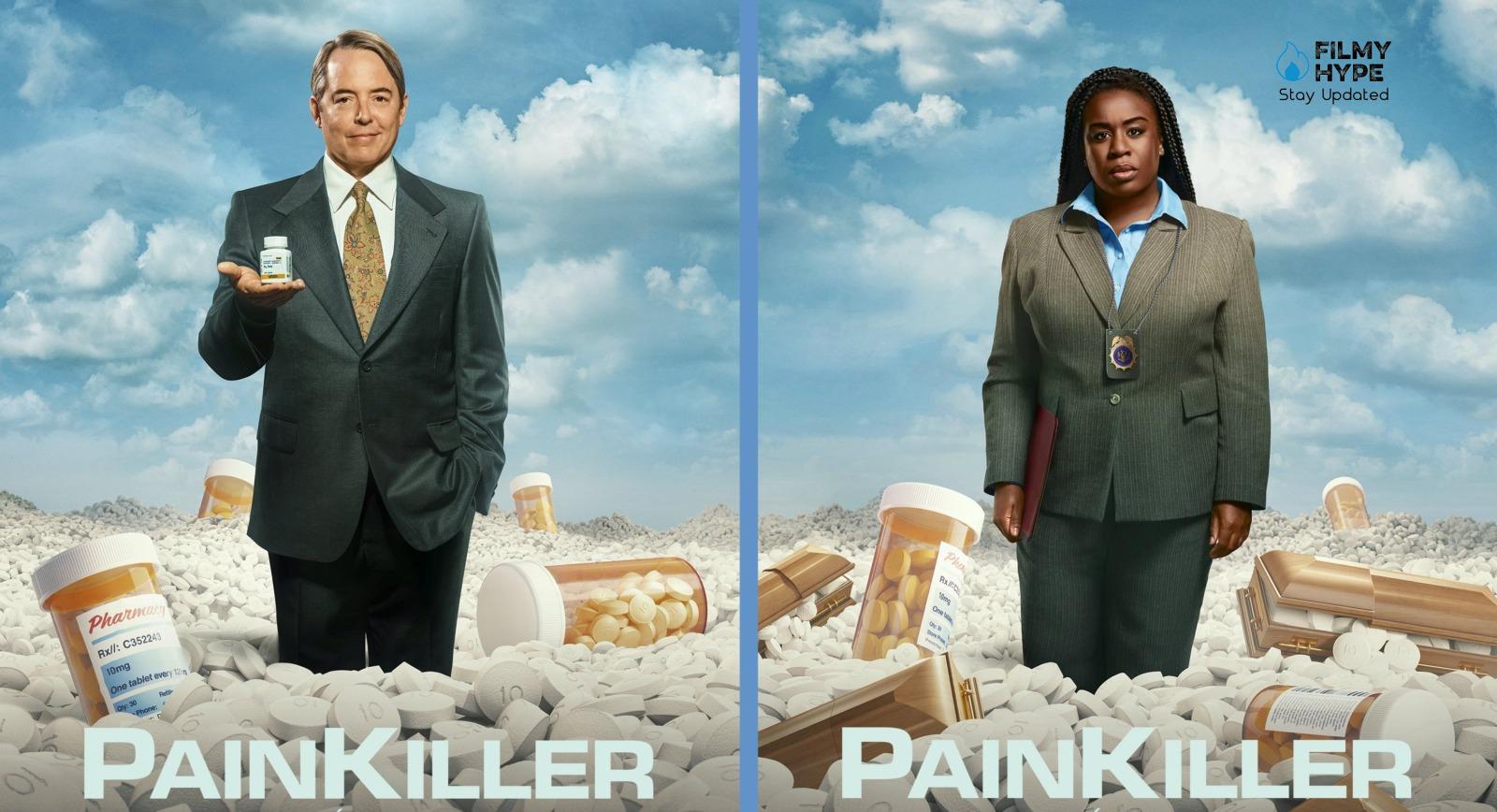Painkiller Series Review: Netflix Series Terrifying But Beautifully Well-Told Story
Cast: Matthew Broderick, Uzo Aduba, Taylor Kitsch, Clark Gregg
Creators: Micah Fitzerman-Blue, Noah Harpster
Streaming Platform: Netflix
Filmyhype.com Ratings: 4/5 (four stars)
Painkiller is an American drama miniseries from Netflix created by Micah Fitzerman-Blue and Noah Harpster. The six-episode series, based on Patrick Radden Keefe’s New Yorker article “The Family That Built an Empire of Pain” and Barry Meier’s Pain Killer: An Empire of Deceit and the Origin of America’s Opioid Epidemic, will focus on the birth of the opioid crisis with an emphasis on Purdue Pharma, the maker of OxyContin. Painkiller will premiere on Netflix on August 10, 2023. The origins of a problem that is one of America’s leading causes of death, focusing on the story of the perpetrators, victims, and truth-seekers whose lives were forever altered by the invention of OxyContin. The causes and consequences of America’s opioid epidemic are at the heart of this drama that follows the perpetrators, the victims, and the person investigating to uncover the truth.

In 2021, the excellent Hulu miniseries entitled Dopesick tried to tell it. The following year the documentary All Beauty and Pain by Laura Poitras plumbed the unexpected consequences by winning the Golden Lion at the 79th Venice Film Festival. We are talking about the terrible epidemic of addiction to oxycodone, a very powerful Painkiller marketed in America by Purdue Pharma since the 1980s, and which in the following years has generated a simply impressive trail of compulsive addiction and deaths. The miniseries Painkiller with Matthew Broderick and Uzo Aduba arrives on Netflix, which once again tells the background and the blackest pages of the creation of the ominous drug OxyContin and its dire consequences. In our Painkiller review, we will focus not only on the plot but also on the intentions and ambitions of this new Netflix product that will certainly capture your attention.
Painkiller Series Review: The Story Plot
When the powerful US pharmaceutical company Purdue Pharma decides to market the revolutionary Painkiller OxyContin, it will be the beginning of one of the most serious and unexpected opioid epidemics ever recorded in the history of contemporary humanity. Painkiller, a six-episode miniseries that illustrates its origins, creation, and shocking consequences, tells the victims and the real characters involved with tact and clarity, bringing to Netflix a gripping insight into a story of drug addiction that most of us don’t know. knew inside out. Painkiller, a six-episode miniseries created in tandem by Micah Fitzerman-Blue and Noah Harpster and directed entirely by Peter Berg, will debut on Thursday, August 10 on Netflix.
An artistic team that has chosen to follow the content and target steps of two other multimedia products that in recent years had already faced the lights and shadows of the terrible opioid epidemic generated by oxycodone: the miniseries Dopesick (with Michael Keaton, currently found on Disney+) and the documentary film All beauty and pain, triumphant at Venice 79 with the prestigious Golden Lion. The story of the diffusion of the drug OxyContin, the Painkiller of the opioid family which has caused more than 300,000 deaths from overdose and addiction to date, becomes in Painkiller a metaphor for a contemporary world where pleasure is one of the most coveted values by human beings together to wealth. And so, addiction to drugs, suffering, and even death is a risk to run to have more and more social recognition and experience even that single moment of pure pleasure.
Painkiller Series Review and Analysis
What Painkiller tells in minute detail is not only largely inspired by what we already anticipated above is a sad true story, but it is also flour in the bag of Fitzerman-Blue by Harpster, the two showrunners who adapted the pages of the book “Pain Killer” by Barry Meier and the New Yorker Times article entitled “The Family That Built The Empire of Pain”. And in fact, the Netflix miniseries concentrates a large part of its narrative strength and content on recounting in detail the vicissitudes of power of the extremely powerful and controversial Sackler family, whose patriarch and dean Arthur (Clark Gregg) was the man behind the unexpected success of Valium.
A spiritual and pharmaceutical legacy which, upon Arthur’s death, passes on to his enigmatic and Machiavellian nephew Richard Sackler (Matthew Broderick), the mastermind behind the controversial decision to take the opioid oxycodone and distill from it a very powerful Painkiller that would cease once for all to put pain at the center of the common symptomatology of the human being. Too bad that the drug OxyContin gradually and increasingly indiscriminately started first a silent epidemic of real addicts from the effects of the medicine, then a rampant crisis at a national level which over the years also caused tragic and painful deaths for the families involved. A necessary story that certainly deserved to be told once again.

Of course, Painkiller suffers from arriving on the streaming platform a little too late compared to products dedicated to the same theme as those mentioned above, yet the Netflix miniseries created by Micah Fitzerman-Blue and Noah Harpster and directed by Peter Berg has an advantage: certainly much more accessible and “romanticized” than the dry and sharp language of the documentary cinema of All beauty and pain and much less painful and shocking than the remarkable Dopesick, Painkiller is a democratic and ecumenical, which tells the beginning and end, lights and shadows, protagonists and victims of one of the most frightening opiate addiction epidemics ever recorded in Western history.
Thanks to the clear, functional, and unpretentious script of the showrunner duo and the cast of actors who give a face to the Painkiller pawns; above all, an unprecedented Matthew Broderick in the role of the cold and calculating Richard Sackler of Purdue Pharma, and Uzo Abuda in those of Edie Flowers, an investigator of the US federal prosecutor’s office at the forefront of the fight against the illegalities of the powerful company pharmaceutical company behind the release of OxyContin. Fundamental elements of an exquisitely choral story that keeps practically glued to the small screen for its entire six-episode duration. A point in favor, therefore, for Painkiller compared to the “relative” projects with which it will necessarily have to deal with at the time of its release on Thursday 10 August on Netflix. Yet the inevitable comparison has placed us in front of a question: is the miniseries of Fitzerman-Blue and Harpster all in all out of time? Deprived of the emotional and provocative element that had made the fortune (and several awards) of Dopesick with Michael Keaton and of the lyricism of Laura Poitras’ documentary.
Painkiller carries out its little task of adapting the book and the investigative article at the end of the day previously mentioned with a trade, without particular artistic flashes or narrative complications. A product that seems to be built more to satisfy an audience of users, especially Netflix, is increasingly algorithmic and subject to viewing preferences with suggestions. Here, however, paradoxically, lies the strength of Painkiller: addressing the largest number of international users of the platform with a simple and exciting television language, who perhaps weren’t even aware of the terrible story behind the Painkiller OxyContin.
Painkiller shows the dangers of a fragile mind, the double face of the world of sales, tells, through the characters of the series, all the charm that money can have on men, even making them lose the light of reason and shows how morality is a much more labile concept in human consciences than one might think. This series is about pain, corruption, parent-child relationships, delusions of grandeur, and then again about the immense gaps in the justice system, and how easy it is to become addicted to any form of instant pleasure. Painkiller excites, anger, and shivers, and at the same time moves to listen to the choked voice of people in the flesh who have lost their loved ones due to OxyContin and who open each of the episodes of the series with their testimony.

Each of the Painkiller characters is perfectly designed to be functional to the story and extremely communicative. Each person in this story, whether true or fictional, pierces the screen, reaches the heart, and is part of a common thread that unites the entire narrative and allows the story to maintain balance on multiple narrative levels. Each level gives the audience a different perspective with which to interpret this engaging yet terrible story, from that of the victim to that of the “perpetrator” showing that, after all, everyone calibrates the concepts of right and wrong according to their point of view. With Painkiller Netflix has surpassed itself, it has allowed the public to enjoy one of the most beautiful series distributed in recent years, to indulge in the vision of a title so communicative, visceral, and profound that it manages to get under the skin. Don’t miss the opportunity to experience this inner journey between ambitions, human weaknesses, anger, addiction, corruption, and an introspective journey in a universe where right and wrong become interchangeable concepts depending on the perspective one assumes. Watch Painkiller and be swept up in a terrifying but beautifully well-told story.
Painkiller Series Review: The Last Words
The Netflix miniseries with Matthew Broderick and Uzo Aduba tells the story of the birth and consequences of one of the most controversial pharmaceutical creations of all time: OxyContin, a Painkiller that, starting in the 1980s, generated an unprecedented addiction epidemic. Ordinary series and without particular flashes, if not often derivative, however, it manages to tell what happened in the USA in those years.






